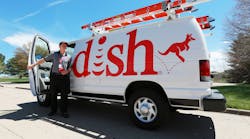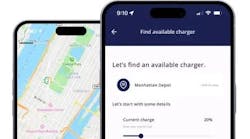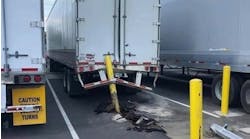Dish Network announced it was looking for opportunities to improve the safety of its fleet drivers, specifically where technology could take the dependence away from the driver and help transfer accountability to the tool or technology.
The solution: Mobileye’s aftermarket collision-avoidance technology.
Dish launched an initial pilot in Chicago that included 12 vehicles. Now, according to the company, Mobileye is on track to outfit approximately 1,000 vehicles this year, which is roughly 25% of the Dish fleet.
Dish will be deploying Mobileye’s aftermarket collision-avoidance technology on all new vehicles through 2016 and will also be installing it on about 200 existing on-road vehicles across 17 targeted offices. The roughly 200 on-road deployments will be a key test for Dish on the mpg savings.
Unlike one-off deployments on new vehicles, the on-road deployments will be for half a dozen to a dozen or more vehicles in those particular offices, where Dish said it will compare before and after changes to mpg for both the control group of vehicles in those locations that do not have Mobileye and those that do, in addition to any differences in accident rates or severity.
The results … so far:
Dish said it saw anywhere from a 40-65% reduction across the various alerts from Mobileye’s aftermarket technology product when comparing their blind baseline period to when they began using the audio alerts (using with telematics devices).
“As part of our efforts to keep drivers safe, we believe technology can provide incremental benefits to training programs focused on safe driving habits and behaviors alone,” said Abe Stephenson of Dish, fleet and administration manager. “We have seen very good results from our initial pilots with Mobileye’s collision avoidance system, including both accident mitigation and fuel savings through more conservative driving habits. We are excited to be expanding our deployment on all new vehicles and targeted on-road vehicles through 2016.”
According to the company, one of the most noticeable benefits was from Headway Monitoring. Dish added that it sees Headway Monitoring as an “everyday benefit that alone could provide the ROI they are looking for, through reduced fuel consumption from more conservative driving.”
Dish reports it saw a 3% increase in fuel savings after deployment compared to the other same-office control vehicles that were not installed with Mobileye. While this was on a smaller sample size, Dish is looking to validate these results on a broader sample size as part of the expanded pilot this year.
According to Mobileye, the fuel savings Dish saw in the small pilot in Chicago was enough to support the ongoing program – especially when trying to compare the more difficult task of measuring things that are not happening and are more infrequent, such as with ROI on accidents.
“An increasing number of fleet owners are looking for technology that can help drivers during those critical moments where there’s a risk of a collision, and at the same time, can help reinforce safe driving behavior to prevent future accidents from occurring,” said Michael Backman, general manager, Mobileye. “Dish had seen an opportunity to improve the safety of their fleet drivers with the real-time alerts our aftermarket product offers. So far, Dish has seen valuable results from the pilot program and will be working with us to deploy even more vehicles with Mobileye’s technology this year.”



